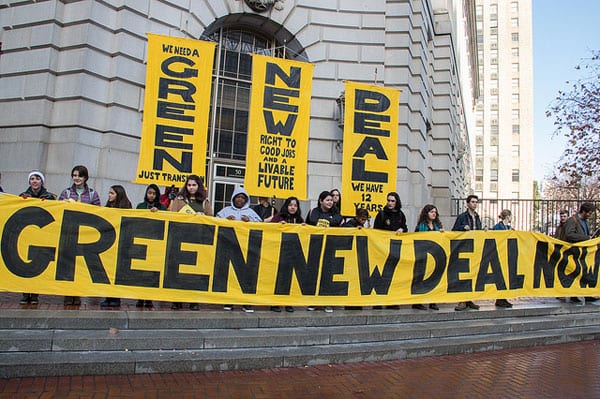
March 7, 2019; Jacobin
“How can we afford it?”
This is the question much of the press asks about the Green New Deal proposal, note Johanna Bozuwa and Thomas Hanna in Jacobin. But, as with Medicare for All, the real question is “how can we afford not to?”
According to Bozuwa and Hanna, both researchers at the nonprofit Democracy Collaborative, making a Green New Deal viable requires implementing a few key structural economic changes. These include expanding public banking and democratizing the Federal Reserve so that financing decisions are aligned with ecological goals. Buzowa and Hanna also call for “nationalizing the fossil fuel industry, taking utilities into public hands, and establishing a national Green Investment Bank.”
Why are these changes needed to achieve carbon reduction goals? A big part of the reason, Bozuwa and Hanna explain, is the need to shift the time horizon of the finance industry from focusing on short-term returns, which are maximized by continuing to finance fossil fuels, to focusing on long-term returns, which are maximized by supporting renewable energy and other green infrastructure. A publicly controlled system allows for credit to be redirected from supporting short-term profit-maximization toward long-term investment in a greener, cleaner economy. “Asserting public control over the financial system is therefore essential if we want to prevent catastrophic climate change,” Bozuwa and Hanna contend.
Sign up for our free newsletters
Subscribe to NPQ's newsletters to have our top stories delivered directly to your inbox.
By signing up, you agree to our privacy policy and terms of use, and to receive messages from NPQ and our partners.
Another structural barrier that stands in the way of making a Green New Deal happen is the fossil fuel industry itself. “Fossil fuel companies,” note Buzowa and Hanna, “have built strong political machines that oppose anything that jeopardizes their business model and short-term shareholder returns.” For this reason, they contend that, “Nationalizing the fossil fuel industry, is the most effective—and at this point, perhaps the only—way to cut through corporate opposition and manage a timely and orderly decline of fossil fuels.”
Nationalizing fossil fuels is not cheap, but neither is the cost insurmountable. An article in The Nation two years ago suggested a price tag of $1.15 trillion—a large sum, but far less than the $3.5 trillion used to rebuild the balance sheets of financial institutions after the Great Recession through Federal Reserve-supported “quantitative easing” that took place between 2008 and 2014. Additionally, when one considers that the US has spent, according to the Watson Institute for International and Public Affairs at Brown University, $5.6 trillion on wars and related medical bills since 2001, spending less than one quarter as much to remove a major barrier to decarbonizing the economy might well be a sensible measure to take. Critically, nationalizing fossil fuels, note Buzowa and Hanna, would give energy firms the right set of incentives—that is, to wind down operations, rather than continuing to maximize profit.
There are no easy answers. “Finance and energy,” note Buzowa and Hanna, “are the engines of a modern society.” It is hard to imagine a successful Green New Deal occurring without these industries being very substantially altered. In short, if finance and fossil fuels were brought under greater public control, forging a new path to ecological and economic sustainability might still be very difficult, but at least it would be possible.—Steve Dubb
Disclosure: The author used to work at the Democracy Collaborative.













